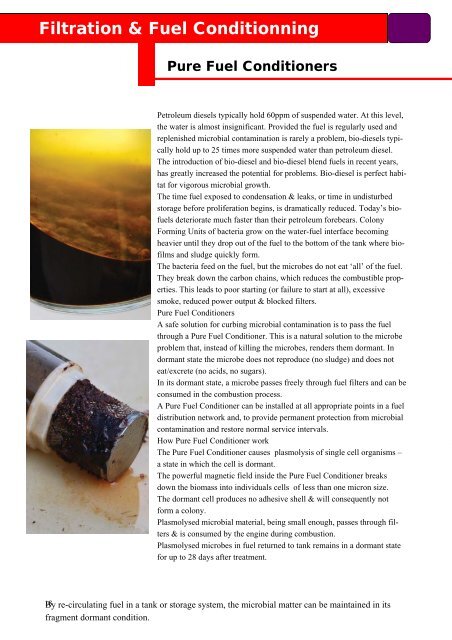WHO WE ARE AND WHAT WE SELL - Denver Petroleum
WHO WE ARE AND WHAT WE SELL - Denver Petroleum
WHO WE ARE AND WHAT WE SELL - Denver Petroleum
Create successful ePaper yourself
Turn your PDF publications into a flip-book with our unique Google optimized e-Paper software.
Filtration & Fuel Conditionning<br />
Pure Fuel Conditioners<br />
<strong>Petroleum</strong> diesels typically hold 60ppm of suspended water. At this level,<br />
the water is almost insignificant. Provided the fuel is regularly used and<br />
replenished microbial contamination is rarely a problem, bio-diesels typically<br />
hold up to 25 times more suspended water than petroleum diesel.<br />
The introduction of bio-diesel and bio-diesel blend fuels in recent years,<br />
has greatly increased the potential for problems. Bio-diesel is perfect habitat<br />
for vigorous microbial growth.<br />
The time fuel exposed to condensation & leaks, or time in undisturbed<br />
storage before proliferation begins, is dramatically reduced. Today’s biofuels<br />
deteriorate much faster than their petroleum forebears. Colony<br />
Forming Units of bacteria grow on the water-fuel interface becoming<br />
heavier until they drop out of the fuel to the bottom of the tank where biofilms<br />
and sludge quickly form.<br />
The bacteria feed on the fuel, but the microbes do not eat ‘all’ of the fuel.<br />
They break down the carbon chains, which reduces the combustible properties.<br />
This leads to poor starting (or failure to start at all), excessive<br />
smoke, reduced power output & blocked filters.<br />
Pure Fuel Conditioners<br />
A safe solution for curbing microbial contamination is to pass the fuel<br />
through a Pure Fuel Conditioner. This is a natural solution to the microbe<br />
problem that, instead of killing the microbes, renders them dormant. In<br />
dormant state the microbe does not reproduce (no sludge) and does not<br />
eat/excrete (no acids, no sugars).<br />
In its dormant state, a microbe passes freely through fuel filters and can be<br />
consumed in the combustion process.<br />
A Pure Fuel Conditioner can be installed at all appropriate points in a fuel<br />
distribution network and, to provide permanent protection from microbial<br />
contamination and restore normal service intervals.<br />
How Pure Fuel Conditioner work<br />
The Pure Fuel Conditioner causes plasmolysis of single cell organisms –<br />
a state in which the cell is dormant.<br />
The powerful magnetic field inside the Pure Fuel Conditioner breaks<br />
down the biomass into individuals cells of less than one micron size.<br />
The dormant cell produces no adhesive shell & will consequently not<br />
form a colony.<br />
Plasmolysed microbial material, being small enough, passes through filters<br />
& is consumed by the engine during combustion.<br />
Plasmolysed microbes in fuel returned to tank remains in a dormant state<br />
for up to 28 days after treatment.<br />
By 16 re-circulating fuel in a tank or storage system, the microbial matter can be maintained in its<br />
fragment dormant condition.


